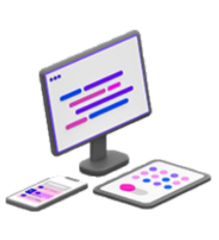The majority of the websites are already able to produce reports or to present various results in HTML pages. While the HTML content is simple generate and edit it is not suitable for printing or for transmission by email. The de facto standard for printing is the PDF format. The HiQPdf HTML to PDF Converter for .NET can be used in your .NET applications to transform any HTML page into a PDF document preserving the original aspect of the HTML document.
The HiQPdf Library for .NET offers you a modern, simple, fast, flexible and powerful tool to create complex and stylish PDF documents in your applications with just a few lines of code.
Using the high quality HTML to PDF conversion engine you can easily design a document in HTML with CSS3, JavaScript, SVG or Canvas and then convert it to PDF preserving the exact content and style.
The main features of the converter are listed below:
- Convert HTML and HTML5 Documents and Web Pages to PDF
- Convert URLs and HTML Strings to PDF Files or Memory Buffers
- Set the PDF Page Size and Orientation
- Fit HTML Content in PDF Page Size
- Advanced Support for Web Fonts in .WOFF and .TTF Formats
- Advanced Support for Scalar Vector Graphics (SVG)
- Advanced Support for HTML5 and CSS3
- Delayed Conversion Triggering Mode
- Control PDF page breaks with page-break CSS attributes in HTML
- Repeat HTML Table Header and Footer on Each PDF Page
- Packaged and Delivered as a Zip Archive
- No External Dependencies
- Direct Copy Deployment Supported
- ASP.NET and Windows Forms Samples, Complete Documentation
- Supported on All Windows Versions
You can find all the HiQPdf Library for .NET Features with a brief description of each feature on product page.

The C# sample code below shows how easy you can create the PDF documents from existing HTML pages or HTML strings. With just a few lines of code you can get richly formatted PDF document:
protected void buttonConvertToPdf_Click(object sender, EventArgs e) { // create the HTML to PDF converter HtmlToPdf htmlToPdfConverter = new HtmlToPdf(); // set browser width htmlToPdfConverter.BrowserWidth = int.Parse(textBoxBrowserWidth.Text); // set browser height if specified, otherwise use the default if (textBoxBrowserHeight.Text.Length > 0) htmlToPdfConverter.BrowserHeight = int.Parse(textBoxBrowserHeight.Text); // set HTML Load timeout htmlToPdfConverter.HtmlLoadedTimeout = int.Parse(textBoxLoadHtmlTimeout.Text); // set PDF page size and orientation htmlToPdfConverter.Document.PageSize = GetSelectedPageSize(); htmlToPdfConverter.Document.PageOrientation = GetSelectedPageOrientation(); // set the PDF standard used by the document htmlToPdfConverter.Document.PdfStandard = checkBoxPdfA.Checked ? PdfStandard.PdfA : PdfStandard.Pdf; // set PDF page margins htmlToPdfConverter.Document.Margins = new PdfMargins(5); // set whether to embed the true type font in PDF htmlToPdfConverter.Document.FontEmbedding = checkBoxFontEmbedding.Checked; // set triggering mode; for WaitTime mode set the wait time before convert switch (dropDownListTriggeringMode.SelectedValue) { case "Auto": htmlToPdfConverter.TriggerMode = ConversionTriggerMode.Auto; break; case "WaitTime": htmlToPdfConverter.TriggerMode = ConversionTriggerMode.WaitTime; htmlToPdfConverter.WaitBeforeConvert = int.Parse(textBoxWaitTime.Text); break; case "Manual": htmlToPdfConverter.TriggerMode = ConversionTriggerMode.Manual; break; default: htmlToPdfConverter.TriggerMode = ConversionTriggerMode.Auto; break; } // set header and footer SetHeader(htmlToPdfConverter.Document); SetFooter(htmlToPdfConverter.Document); // set the document security htmlToPdfConverter.Document.Security.OpenPassword = textBoxOpenPassword.Text; htmlToPdfConverter.Document.Security.AllowPrinting = checkBoxAllowPrinting.Checked; // set the permissions password too if an open password was set if (htmlToPdfConverter.Document.Security.OpenPassword != null && htmlToPdfConverter.Document.Security.OpenPassword != String.Empty) htmlToPdfConverter.Document.Security.PermissionsPassword = htmlToPdfConverter.Document.Security.OpenPassword + "_admin"; // convert HTML to PDF byte[] pdfBuffer = null; if (radioButtonConvertUrl.Checked) { // convert URL to a PDF memory buffer string url = textBoxUrl.Text; pdfBuffer = htmlToPdfConverter.ConvertUrlToMemory(url); } else { // convert HTML code string htmlCode = textBoxHtmlCode.Text; string baseUrl = textBoxBaseUrl.Text; // convert HTML code to a PDF memory buffer pdfBuffer = htmlToPdfConverter.ConvertHtmlToMemory(htmlCode, baseUrl); } // inform the browser about the binary data format HttpContext.Current.Response.AddHeader("Content-Type", "application/pdf"); // let the browser know how to open the PDF document, attachment or inline, and the file name HttpContext.Current.Response.AddHeader("Content-Disposition", String.Format("{0}; filename=HtmlToPdf.pdf; size={1}", checkBoxOpenInline.Checked ? "inline" : "attachment", pdfBuffer.Length.ToString())); // write the PDF buffer to HTTP response HttpContext.Current.Response.BinaryWrite(pdfBuffer); // call End() method of HTTP response to stop ASP.NET page processing HttpContext.Current.Response.End(); }
You can find more HTML to PDF C# and VB.NET samples in the online demo.

